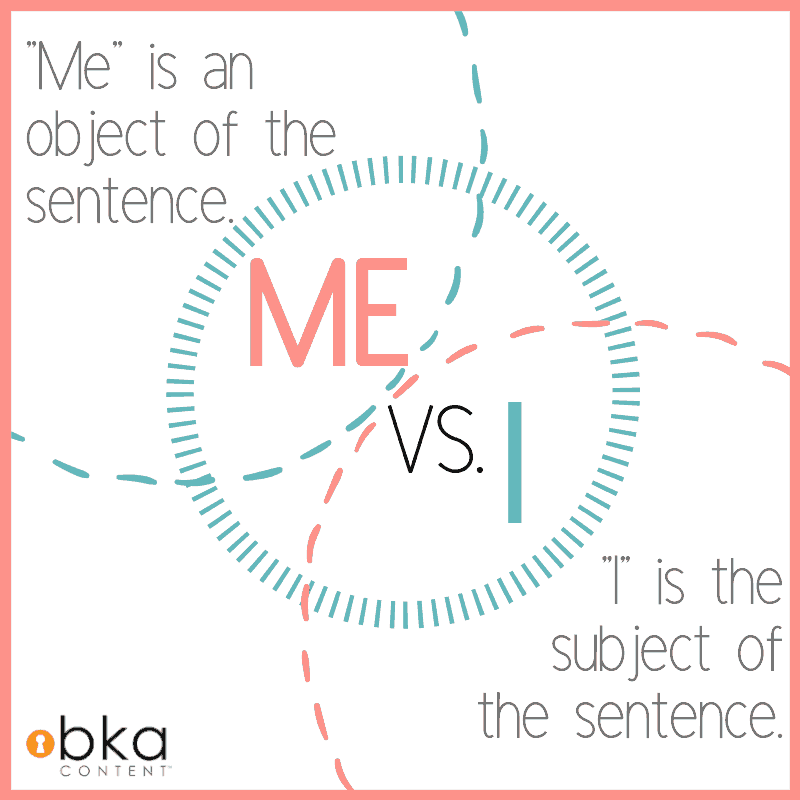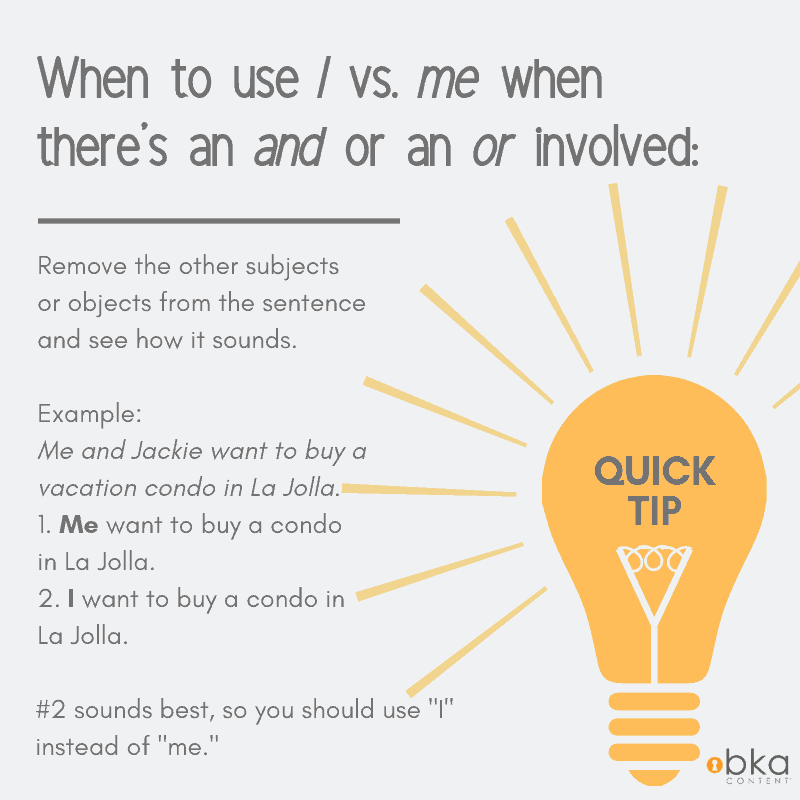
Commonly Confused Words: Me vs. I

Me, myself, and I is more than just a classic De La Soul track. It’s also a trio of words that are frequently mixed up — particularly me vs. I.
Given how much we as human beings love to talk about ourselves, you’d think we’d know how to do it correctly. After all, we’ve mastered the art of the selfie and the tearful Oscar acceptance speech. Some of us even celebrate an entire birthday month instead of just a single day with some streamers cake, as well as five bucks from Grandma.
If we’re only going to fall deeper in love with ourselves in the digital age, it seems prudent that we learn how to differentiate between me and I. Let’s hit it.
I vs. Me: When Should You Use Me and When Should You Use I?
All self-absorbed kidding aside, it’s super-easy to mix up I vs. me since they mean the same thing. Remembering the following two facts can help you grow as a writer and better navigate this whole you and I vs. you and me confusion.

1. I is the subject of a sentence.
Use I when the speaker is the one who’s doing something in the sentence, as in these three rapid-fire examples:
- I hate possums.
- I lost my shoe at Lollapalooza.
- It is I who stole the cookie from the cookie jar!
In all three of these sentences, I is the subject. I is the one who spent her summer hating on possums, losing her shoes in a big, beer-soaked field, and stealing oatmeal cookies. I is the one taking action, which makes I the star of the show, aka the subject of the sentence.
2. Me is an object.
Use me when the speaker in the sentence is on the receiving end of some action, as in this quick trio of examples:
- My cat gave me a black eye.
- Brent saved a seat for me on the roller coaster.
- Birds make me nervous.
In all three of these sentences, me is not the person (or animal) that’s doing something. Me is the one to whom something is being done, whether that’s receiving a cat-punch, a seat next to Brent on a roller coaster, or crippling anxiety because birds always have the high ground.
It doesn’t matter if me is the direct object or the indirect object. It doesn’t matter if the speaker is the object of a preposition. If that speaker is an object, that speaker should be me and not I. Take a look:
- The foul ball hit me.
Here, me is the direct object of the verb hit because it was the speaker’s ugly mug that got walloped with a baseball.
- Kelly gave me lice.
Gross. Also, me is the indirect object in this sentence. The direct object is the lice that Kelly so generously passed on to the speaker’s itchy, itchy head.
- Grandma loudly unwrapped a hard candy for me.
Let’s switch things up. In this example, me is the object of the preposition for. It answers the question, “Grandma loudly unwrapped a hard candy for whom?”
Me vs. I: What Happens When You Throw ‘And’ in There?

The I vs. me rules get extra confusing when the word and shows up on the scene. Have a look at these two examples:
- Liam and me met Oprah.
- Liam and I met Oprah.
Which one is correct? It’s the second option, and here’s why: Liam and I are both subjects of the sentence. Liam met Oprah, and I met Oprah. Unless you’re a caveperson or Cookie Monster, it doesn’t sound right to say, “Me met Oprah.”
Here’s another pair of sentences that pit I vs. me:
- Me and my sisters used to pretend the floor was lava.
- My sisters and I used to pretend the floor was lava.
Once again, the second option is the correct one because I is one of two subjects. (The sisters are the other.) Since the speaker is the subject, the correct word is I.
Let’s check out one more head-to-head duel. Which one is correct?
- Our boss gave Dustin and me gift certificate to Olive Garden.
- Our boss gave Dustin and I gift certificates to Olive Garden.
Holy unlimited breadsticks, Batman! Me is actually the right answer here because, in this instance, Dustin and the speaker are both objects — indirect objects, to be precise. The boss is the one doing the action of the sentence (handing out free spaghetti money). Dustin and the speaker are both receiving the action. That means the correct choice for this I vs. me question is me.
The Secret to Me vs. I: Check Yourself Before You Wreck Yourself

Here’s a quick tip for deciding whether to use I or to use me when there’s an and or an or involved. Simply remove the other subjects or objects from the sentence and see how it sounds. For example, if the sentence was this:
- Me and Jackie want to buy a vacation condo in La Jolla.
You could take out and Jackie and read the sentence again to check that me is the right word:
- Me want to buy a vacation condo in La Jolla.
Caveman alert! The fact that this sentence sounds weird is a good indicator that you need to use I instead:
- I and Jackie want to buy a vacation condo in La Jolla.
Let’s test it by taking out and Jackie again:
- I want to buy a vacation condo in La Jolla.
That’s it. That sounds good. Let’s cut Jackie back in on the deal:
- I and Jackie want to buy a vacation condo in La Jolla.
OK, that sounds weird again, right? Grammatically, it’s correct. In conventional English, however, you should list yourself last when you’re referring to a roster of people, like so:
- Jackie and I want to buy a vacation condo in La Jolla.
Boom! Done. Now that we’ve upped our writing game, we just need to figure out when Jackie and the speaker are having us over to sip drinks with little umbrellas in them on the beach.
Me vs. Myself: When Do You Use Myself?
Another common mistake that writers make is using myself when they should use me. While me is an object pronoun, myself is a reflexive pronoun. Here’s how to solve the me vs. myself conundrum.
Use Myself When the Speaker Is Both the Subject and the Object
Reflexive pronouns are used when the subject and object of a sentence are the same. There are nine of them, and they all end in -self or -selves. How conceited.
|
myself |
ourselves |
|
yourself |
yourselves |
|
himself, herself, oneself, itself |
themselves |
In the case of me vs. myself, the speaker should use myself only when he or she is doing the action and receiving the action, too. Here are two examples:
- I would describe myself as beautiful, intelligent, and humble.
Here, myself is correct because the speaker is both doing the describing and being described. That makes the modest, unassuming speaker the subject and the object.
- After losing 10 pounds, I rewarded myself by eating an entire cheesecake.
In this rich example, myself is the right call because the speaker is the one giving the reward and the one getting the reward. He or she is the subject, the object, and really going to regret all that dessert tomorrow.
Understanding Me vs. I
Much of understanding me vs. I vs. myself comes down to pinpointing who’s doing what in the sentence. Do you have any hacks for remembering which pronoun to use? Got any big plans for your birthday month? Blow out your candles and make a wish in the comments below.
- Contractions Grammar 101: A Guide With Examples - December 13, 2023
- What Is an Antonym? Opposites 3 Ways - December 9, 2023
- Analogy Definition With Detailed Examples - December 8, 2023

